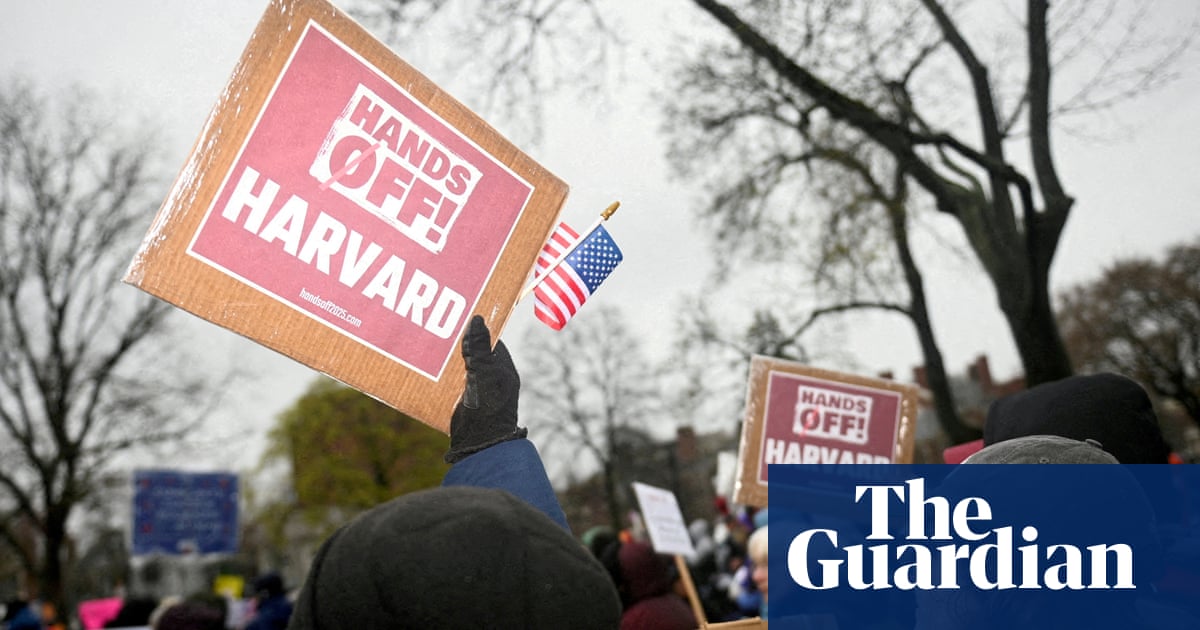Good morning.
The Department of Education told Harvard University yesterday that it wasending billions of dollars in research grantsand other aid unless the school acceded to a list of demands from the Trump administration that would effectively cede control of the nation’s oldest and wealthiest university to the government.
The news was delivered to Dr Alan Garber, Harvard’s president, in a deeply partisanletter from Linda McMahon, the education secretary, filled with extended diatribes about a series of grievances.
The main reason for the crackdown on Harvard is the school’s rejection of a long list of demands from the Trump administration’s antisemitism taskforce, prompted by campus protests against Israel’s bloody military campaign in Gaza. McMahon also accuses the university of “a systematic pattern of violating federal law”.
What impact might the funding suspension have?In its lawsuit fighting against the Trump administration, Harvard said the government’s funding cuts would have stark “real-life consequences for patients, students, faculty, staff [and] researchers” by ending crucial medical and scientific research.
A senior Hamas official has told AFP the group isno longer interested in truce talks with Israelafter Benjamin Netanyahu announced yesterday a new “intensified” offensive in Gaza that would involve Israeli troops holding on to seized territory and significant displacement of the population.
“There is no sense in engaging in talks or considering new ceasefire proposals as long as the hunger war and extermination war continue in theGazaStrip,” Basem Naim said, urging the international community “to pressure the Netanyahu government to end the crimes of hunger, thirst, and killings” in Gaza.
His comments come a day after Israel’s military said expanded operations in Gaza would include displacing “most” of its residents.
What is Israel’s plan for seizing Gaza?Netanyahu, accused of prolonging the war for his own political survival, did not say how much territory would be seized by soldiers, but said Israeli troops would not go into Gaza, launch raids and then retreat quickly. “The intention is the opposite of that,” he said.
What is the latest with the Israeli aid blockade on Gaza?Hunger is being used as a “weapon of war”, according to a Guardianeditorial on Sunday. Flour is said to cost 30 times more than before the war. Aid warehouses are empty. UN World Food Program bakeries closed a month ago when supplies ran out; essential community kitchens are now following. This is despite the strong legal consensus that occupying powers have an absolute duty under the Geneva conventions to permit food to be given to a population in need.
Ukrainian dronestargeted Moscowfor the second night in a row, forcing the temporary closure of the capital’s airports, Russia’s military reported.
The consecutive attacks came ahead of Moscow this week marking the 80th anniversary of the victory of the Soviet Union and its allies over Germany in the second world war.
Vladimir Putin tried to call a three-day ceasefire for the 8-10 May anniversary; however, Ukraine’s president, Volodymyr Zelenskyy, characterised the idea as self-serving and pointless unless it lasted 30 days in line with a US proposal that the Russian president has ignored.
What are the details?The Moscow mayor, Sergei Sobyanin, said at least 19 Ukrainian drones approached Moscow “from different directions”. Three social media sites with links to Russian security services – Baza, Mash and Shot – said one drone struck an apartment building near a major road in the south of the capital, smashing windows. There were no reports of casualties.
A Palestinian activist who appeared in a Louis Theroux documentary about settlers in the West Bank has reportedly had his homeraided by Israeli soldiers.“They don’t see us as equal human beings who deserve the same rights they do,” Issa Amro said.
The former vice-president Mike Pence hasrebuked Trumpover tariffs and his “wavering” support for Ukraine,saying his import duties are “not a win for the American people”.
Germany’s chancellor-elect, Friedrich Merz, wasnot approvedby the Bundestag in Berlin,in a shock first ballot.
An X-ray hasrevealedthat a scroll was authored by the Greek philosopher Philodemus,nearly 2,000 years after it was torched by Mount Vesuvius volcano ash in AD79.
As Europe marks the 80th anniversary of VE Day, aYouGov pollacross a range of countries found many believe a devastating third global conflict could break out within a decade. In the US, 14% said it was very likely and 31% said it was fairly likely.
Some have nicknamed it the“Trump slump”and suggested the phenomenon was spreading. But even after liberal victories in Australian and Canadian elections, experts and analysts disagree over the reviving in fortunes of center-left parties.
A coalition of Democratic state attorneys general sued on Monday in anattempt to block Donald Trump’s moveto suspend leasing and permitting of new wind projects, saying it threatens to cripple the wind industry and a key source of clean energy.
This year’s Met Gala theme was “Superfine: Tailoring Black Style”, looking back at 300 years of Black fashion alongside the history of Black dandyism. It coincides with a gallery opening of the Met’s first fashion exhibition devoted entirely to designers of color. Check out what celebrities worehere.
First Thing is delivered to thousands of inboxes every weekday. If you’re not already signed up,subscribe now.
If you have any questions or comments about any of our newsletters please emailnewsletters@theguardian.com
